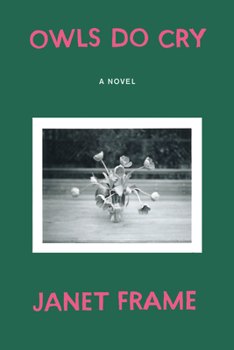Owls Do Cry
Select Format
Select Condition 
Book Overview
First published in New Zealand in 1957, Owls Do Cry, was Janet Frame's second book and the first of her thirteen novels. Now approaching its 60th anniversary, it is securely a landmark in Frame's catalog and indeed a landmark of modernist literature. The novel spans twenty years in the Withers family, tracing Daphne's coming of age into a post-war New Zealand too narrow to know what to make of her. She is deemed mad, institutionalized, and...
Format:Paperback
Language:English
ISBN:1619028409
ISBN13:9781619028401
Release Date:December 2016
Publisher:Counterpoint LLC
Length:211 Pages
Weight:0.64 lbs.
Dimensions:0.7" x 5.9" x 8.9"
Customer Reviews
5 ratings
A Masterful Piece Of Fiction
Published by Thriftbooks.com User , 14 years ago
This book, in my opinion, buries Sylvia Plath's The Bell Jar. Though that was a great book, this book had me until the very end. And the end was not even close to what I expected. Her writing style is a bit different. It is almost like reading poetry when she describes the scenes. Janet Frame is an author that deserves to be read by more people. It is a shame she did not get more praise here in the United States before her death. Anyone who knows her life story and what she went through will really appreciate this book. Even if you don't know her life story, I say read the book. You won't regret it.
Ariel in hospital
Published by Thriftbooks.com User , 18 years ago
Despite another reviewer's rather too exacting and, to my mind, strained equation of this novel with The Tempest, with Daphne or Janet Frame as Prospero, I think the true place to look for such complete comparison is in John Fowles's The Magus and in various works of Iris Murdoch. For Daphne is much more Ariel than Prospero, as the title and quote at the beginning should more than slightly hint. Ariel's songs have long been an inspiration to poets and poetic writers (Shelley and John Clare come to mind)for their inspired linguistic beauty and magical quality. The sense one gets from all these writers is that the "normal" way of seeing things is not quite spot on, that there is a magic, delightful and disturbing, by turns, undercurrent to our quotidian perceptions. Janet Frame, in this book, manages to lyrically, poetically convey that Ariel-inspired sense better than anyone in any novel I've yet to read. Yes, the hospital setting and what not is harrowing. But Daphne's description of her stay there is deep and magical and wonderful....So is the rest of the book.....Buy it this summer, "merrily", as Ariel would have it.
Exquisite, Painful Writing
Published by Thriftbooks.com User , 19 years ago
So much better than other 'madhouse' books - knocks The Bell Jar into a distant corner, Janet Frame is one of the most poignant and moving of writers. She was so injured by life but is able to achieve an extraordinary almost clinical separation in her literary creations when writing of things that should have been too great to bear. I have to be feeling very strong to take her in. An Angel at My Table brought her to the fore for a while, but she has never really occupied the place she deserves in the front of people's minds. Time for a big rediscovery I'd say. But when you look at the sales ranking her titles gain, the probability is slim. Shame. Come on literary public, give her a go - come on her publishers push those books back onto the shelves.
In search of treasure
Published by Thriftbooks.com User , 23 years ago
Owls Do Cry, Frame's first full-fledged novel, is a poetic anthem to human spirit and endurance and speaks ultimately to universal concerns. A remarkable novel from a gifted artist.
A Beautifully Stylised View of a Family
Published by Thriftbooks.com User , 23 years ago
This novel follows a linear time scale of the growth in a family's generation with occasional shifts backward or forward to comment on the present. It focuses on the intense emotions of its characters through a detailed focus on objects and the character's speech. There are eloquent descriptions of clothing, the setting of their hometown and even the rubbish in the junkyard the children play in. The most striking part of the book is the long sections narrated from the third person singular perspective of Daphne who spends a good part of her life in a mental institution. These sections are highly poetic and suggest the other language with which people who are mentally think by seeing the world not as reality but as a clutter of subconscious and symbolic images. This, in contrast with the long diary entries of Daphne's sister Teresa (Chicks) who lives in a conventional domestic style maps the different patterns by which people think and reminds you that the world can be perceived in a multitude of different ways. Through poignant metaphorical descriptions and sharp dialogue she conveys what is missing in human relations, especially between family members. There is a delicately portrayed need for genuine respect of the individuality of the children apart from the fixed images acquired in childhood. People change; identity is fluid. When an image of them is maintained or they are held up to an ideal (like the Bessicks who turn out not to be so ideal) then a connection is lost and the individual is left isolated. They become a stranger. This is emphasised in the epilogue where a socially prominent couple discuss articles in a newspaper who they know nothing about but are characters we have become intimately involved with over the course of the novel. It is a beautiful, intimate and heartbreaking portrayal of a family.




